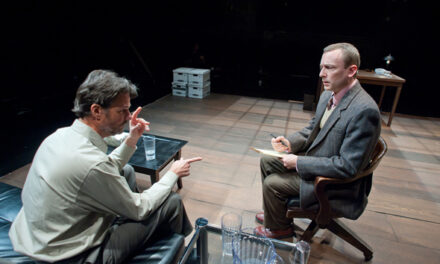It’s a cliché to note that sometimes the ancientest art has the most to say about the way we live now, but it bears repeating. What’s remarkable in that statement is not that the great dramatists of antiquity were such prescient geniuses, but that the human has learned so little since the plays were written. Few plays, then, can be timelier — or more apt to our current epoch — than Seneca’s Thyestes. The wars depicted in Raleigh Ensemble Players artistic director C. Glen Matthews’ current environmental mounting of the Caryl Churchill adaptation (through May 10 in Gallery II, Artspace) may be private in nature; but as all acute social observers know, there are no more publicly reverberant battles than those among the powerful.
I should say at the outset that Matthews’ staging, while ingenious, has its disadvantages. Because large chunks of the production must be observed out of a seated position, this Thyestes is not recommended for those who suffer lower back pain, hemorrhoids, or any complaint that militates against standing for any length of time — nor for those who do not wish to be herded, prodded, moved about, and occasionally grabbed onto, by actors. A certain physical (and psychic) stamina is called for.
What Matthews and company gain in moving the audience around specific areas of Artspace and in forcing it to view the play’s events from varying angles, is an immediacy, and an intimacy, that might not be possible in a conventional staging. On the other hand, that not only are we allowed to be seated for the play’s arresting final scene, the fact that its mounting horror and pity are scarcely mitigated by this is a fairly good argument in favor of tradition.
If I seem to be debating both positions at once, I am. I found participating in the show uncomfortable at times, and wondered whether such “interactive” design was truly necessary. Yet in thinking about this most unusual production afterward, I find its imagery burned into my brain like a series of indelible jolts. Would I — could I — have had the same experience of the play under different, less adventurous, if occasionally extreme, circumstances? I can’t help suspecting that my very ambivalence is some proof of Matthews’ triumph.
The sibling rivalry between Thyestes (David Henderson) and Atreus (Sean A. Brosnahan) gets played out here as a modern public spectacle, complete with anti-war picket signs, microphones, live video transmissions, and the aura of a true media circus. Atreus’ revenge for his brother’s previous treachery becomes the sort of stage-managed event our leaders and their journalistic lackeys call, with no apparent irony or embarrassment on either side, a photo-op.
In conjunction with Bill Rodgers, the play’s scenic designer, Matthews transforms Artspace into a traveling carnival and Thyestes into a kind of wonder show. Their approach gives us the Furies (Barbette Hunter, Carolyn Usanis, and Bobbi Vinson) as a quite literal wailing wall, the women’s torsos bound in white sheets that form a backdrop and which (after tormenting the Ghost of Tantalus) they pull down and transform into long, eerily elegant trains.
Matthews’ use of the Chorus as commenting entity and active — indeed, militant — perceiver makes for some occasional scenic and auditory confusion, but at its most effective the concept makes for potent contrast to the privilege of kings. Churchill’s Atreus observes, smugly, that “the best thing about being a king is that people don’t just endure what you do — they praise you for it,” yet he remains as blind to the desires of his people as a certain national leader to whom Atreus bears more than passing resemblance.
The Chorus members, dust-coated plebes all, are protean in the best ancient sense: they become picketing protestors, camera crews, keening mourners chanting an oratory of despair, and affectingly mute witnesses to the agonized description of atrocity. And while I don’t agree with Matthews’ use of video monitors in toto, the use of them here adds a chilling subtext, particularly one involving Betsy Henderson, the finest of the choristers. In a small but aching moment while “interviewing” the grieving Messenger (SaRaH! Kocz, who is superb here despite that unfortunate moniker) she silently commands her videographer to cut the live feed at an especially upsetting detail of infanticidal butchery.
Sean Brosnahan’s Atreus, coming from a very gifted actor, is a grave disappointment. He plays the king’s obsessions in a style so manic and declamatory he all but froths at the mouth. It’s a performance without nuance or human reflection, as giddily evil as Dishonest John plotting against Cecil; all he lacks is a mustache to twirl. Far more effective is David Henderson’s Thyestes. I’ve probably embarrassed myself enough singing Henderson’s praises in these pages, so I’ll temper the encomia by noting that for economical gesture and varied delivery that carry worlds within them, no local actor compares to this one. His final agonies pull us up by the roots and leave us bruised, and bleeding.
What I said earlier about my own ambivalence? The hell with it. And while we’re at it, the hell with theater that comforts. A play you don’t discuss afterward is an evening consummately wasted.
Raleigh Ensemble Players presents Thyestes Thursday, May 1, at 8 p.m.; Saturday, May 3, at 8 p.m.; Sunday, May 4, at 3 p.m.; and Wednesday-Saturday, May 7-10, at 8 p.m. in Gallery II, Artspace, 201 East Davie St., Raleigh, North Carolina. (NOTE 1: On May 2 from 7 to 9 p.m., REP will host an Open Studio in Gallery II of Artspace. The entire community is invited to help create an inclusive “living sculpture” to illuminate themes in Seneca and Caryl Churchill’s text that are relevant to its experience. NOTE 2: The May 9 show will be a sign-language-interpreted and audio-described performance, with a Touch Tour starting at 7 p.m.) $15 ($10 students with ID and $12 seniors over 60 and military personnel). 919/832-9607, TTY: 919/835-0624. http://www.realtheatre.org/pages/current2003.htm.











